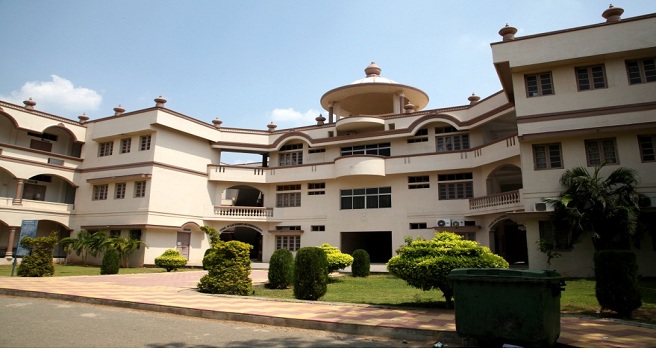COURSE DETAILS
Course Name : Electronics and Communication Engineering
The Department of Electronics and Communication Engineering (ECE), established in 1995, offers comprehensive undergraduate (B.Tech) and postgraduate (M.Tech in VLSID) programs, with intakes of 240 and 18 students, respectively. Additionally, we offer a full-time doctoral program. Recognized as a potential Research Centre by Jawaharlal Nehru Technological University Anantapur, Anantapuramu in 2013, our department specializes in cutting-edge research areas, including Nano Electronics, VLSI technologies, Communication systems, and Signal and Image Processing.
Our state-of-the-art infrastructure comprises 11 well equipped laboratories, an Ideation and Innovation Center, and a Virtual Nano Lab, providing access to advanced tools and software, such as Cadence, Atomistix Toolkit, Xilinx, Matlab, LabView, FPGA, Arduino, Raspberry Pi, and NI myPro Kit. Our affiliation with prestigious professional bodies like IEEE, IETE, IE(I) and ISTE further enhances research opportunities for both faculty and students.
Our distinguished faculty, consisting of 6 professors and 18 doctorates, brings extensive research, development, innovation, and design experience to the classroom. The department has secured approximately Rs.1.34 crore in sponsored projects and consultancy from DST, SERB, and AICTE. Our commitment to excellence is reflected in our continuous accreditation by the National Board of Accreditation (NBA) since 2003, with recent Tier-1 accreditations in 2017, 2020, and 2023.
Intake
240
Course Duration
4yrs
Course Credits
160
Total Semesters
8
Vision
- To become a center of excellence in academics and research in Electronics and communication engineering. .
- To empower society by addressing current and future needs through innovation,ethical practices and human-centered solutions
Mission
- To educate the students in latest technologies to achieve best standards in theoretical and practical aspects.
- To have a strong collaboration with electronics industry.
- To develop indigenous and appropriate technologies at low cost to help the rural people.
Program Specific Outcomes (PSO's)
- Students are able to analyze and design the electronic circuits with the knowledge of courses related circuits, networks, linear digital circuits and analog electronics.
- Students can explore the scientific theories, ideas, methodologies in operation and maintenance of communication systems to bridge the gap between academics and industries.
- Students are able to work professionally with new cutting edge Technologies in the fields of electronic design, communication and automation.
Program Educational objectives (PEO's)
- To train competent Electronics & Communication Engineers in analysis, design and testing of electronics systems by providing modern tools.
- To prepare graduates to take up gainful employment in core sector and prepare them for a successful career in Multinational companies.
- To impart skills to develop affordable products for rural people by adopting multidisciplinary approach.
- To undertake sponsored projects, consultancy and internships by strengthening industry institute collaboration.
Program Outcomes (PO's) - Engineering Graduates will be able to:
- Engineering knowledge: Apply the knowledge of mathematics, science, engineering fundamentals, and an engineering specialization to the solution of complex engineering problems.
- Problem analysis: Identify, formulate, review research literature, and analyze complex engineering problems reaching substantiated conclusions using first principles of mathematics, natural sciences, and engineering sciences.
- Design/development of solutions: Design solutions for complex engineering problems and design system components or processes that meet the specified needs with appropriate consideration for the public health and safety, and the cultural, societal, and environmental considerations.
- Conduct investigations of complex problems: Use research-based knowledge and research methods including design of experiments, analysis and interpretation of data, and synthesis of the information to provide valid conclusions.
- Modern tool usage: Create, select, and apply appropriate techniques, resources, and modern engineering and IT tools including prediction and modelling to complex engineering activities with an understanding of the limitations.
- The engineer and society: Apply reasoning informed by the contextual knowledge to assess societal, health, safety, legal and cultural issues and the consequent responsibilities relevant to the professional engineering practice.
- Environment and sustainability: Understand the impact of the professional engineering solutions in societal and environmental contexts, and demonstrate the knowledge of, and need for sustainable development.
- Ethics: Apply ethical principles and commit to professional ethics and responsibilities and norms of the engineering practice.
- Individual and team work: Function effectively as an individual, and as a member or leader in diverse teams, and in multidisciplinary settings.
- Communication: Communicate effectively on complex engineering activities with the engineering community and with society at large, such as, being able to comprehend and write effective reports and design documentation, make effective presentations, and give and receive clear instructions.
- Project management and finance: Demonstrate knowledge and understanding of the engineering and management principles and apply these to one’s own work, as a member and leader in a team, to manage projects and in multidisciplinary environments.
- Life-long learning: Recognize the need for, and have the preparation and ability to engage in independent and life-long learning in the broadest context of technological change.
